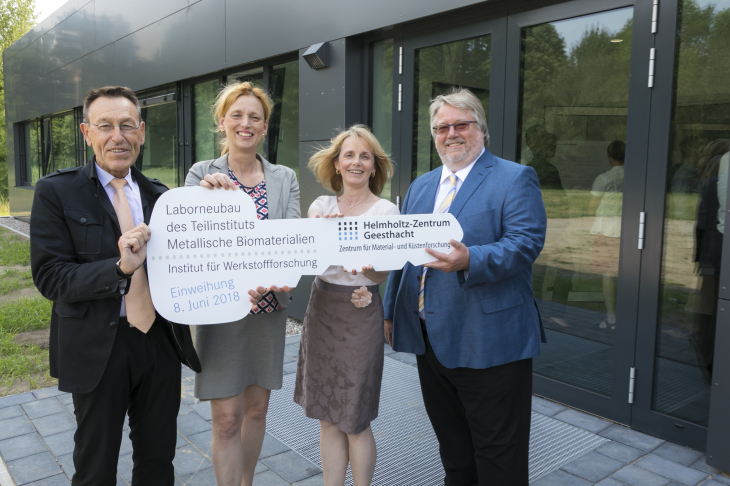Minister Karin Prien opens new laboratory building for magnesium implants
After just a year of construction, the new laboratory building for materials researchers at the Helmholtz-Zentrum Geesthacht (HZG) has been opened on 8 June. The minister of education for Schleswig-Holstein, Karin Prien, and Dr Herbert Zeisel, ministerial director of the federal ministry for education and research, will present the head of the branch of metallic biomaterials, Professor Regine Willumeit-Römer, with the symbolic keys to the building. Hamburg's state councillor from the agency for science, research, and equalities, Dr Eva Gümbel, will also participate in the ceremony in Geesthacht.

Prof. Dr. Wolfgang Kaysser,Karin Prien, Prof. Dr. Regine Willumeit-Römer, Dr. Herbert Zeisel. [Bild: HZG/ Jan Rasmus Lippels]
With an area of approximately 320 square metres, research under excellent parameters will be able to commence immediately. "Our centre's strategy is to focus more strongly on connecting research into high-tech materials with biologisation and digitisation in future", explains Professor Wolfgang Kaysser, scientific director of the HZG. "For that reason, I am extremely pleased to be taking another big step in this direction with the opening of the laboratory."
Professor Regine Willumeit-Römer added: "We are very pleased that we will now be able to take our research into implants to the next level with state-of-the-art facilities. In order to establish biologically degradable implants as standard therapy in medicine, we need to clarify how breakdown products influence the body down to the smallest detail." In the new spaces the scientists will now work on finding the best conditions in which to develop magnesium implants for pre-clinical studies.
Advantage Biomaterial-Implants
- Biodegradable implants are able to be dissolved in the body on their own
- Patients are therefore spared a second operation to remove the foreign object
- In paediatrics in particular, where the bones are still growing, this offers real benefits
More space for biomaterials research
![More space for biomaterials research: new laboratory building on approximately 320 square metres. [Photo: HZG/Rasmus Lippels] the laboratory area for the institute "Metallic Biomaterials](/imperia/md/images/hzg/presse/pressemitteilungen/2018/fittosize__730_0_541c99ecfdc0711bf4d4af76402bc03d_hzg-neubauten-2018-183.jpg)
More space for biomaterials research: new laboratory building on approximately 320 square metres. [Photo: HZG/Rasmus Lippels]
In the state-of-the-art building approximately 20 staff will shortly intensify work on their research projects. They are investigating, among other things, how metallic implants interact with their biological surroundings. In some areas it remains unclear how magnesium screws or stents behave in the body.
Only founded in 2015, the metallic biomaterials branch has already presented numerous successful research projects worldwide. Alongside Germany and a host of European partners there are also very good international contacts. According to Willumeit-Römer: "At the moment, to give one example, we are investigating how magnesium implants can be deployed in specific tumour diseases, in conjunction with research institutes in Russia". The project, funded by the Helmholtz Association and the Russian Science Foundation, aims to develop new applications for magnesium implants in medicine.
Regionally the branch has close links with research institutes in the Hamburg metropolitan region and with Kiel, Lübeck, and Flensburg. Dr Regine Willumeit-Römer is, for example, a professor at the Faculty of Engineering at Christian-Albrechts-Universität in Kiel.
The institute was evaluated by international assessors for the first time in 2017. The panel of experts certified the scientific work of the HZG biomaterials research at the highest level. The branch of metallic biomaterials received the best possible overall rating of "outstanding".
At a glance
- Opening of the new laboratory building at the metallic biomaterials branch at the Helmholtz-Zentrum-Geesthacht on 8 June 2018
- Approximately 320 square metres of laboratory space,
- Building costs: 2.1 million euros.
- The opening will be attended by representatives of the responsible education ministries from Hamburg, Schleswig-Holstein, and the state.
Contact

Public relations
Phone: +49 (0) 4152 87 1648 / mobile: +49 (0) 171 806 4979
E-mail contactHelmholtz-Zentrum Geesthacht
